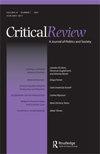The Imaginary Force of History: On Images, the Imaginary, and Myths in Foucault’s Early Works
IF 1.7
3区 社会学
Q4 POLITICAL SCIENCE
引用次数: 0
Abstract
ABSTRACT In manuscripts and unpublished articles written in the 1950s, Foucault developed a notion of myth that was intimately linked to what he called “imaginary forces,” a notion that he framed as a new critical approach. Its most important functions lie in exposing how mythological narratives naturalize social processes, and in developing a skeptical stance towards the allegedly liberating function of truth. This notion of myth is central in History of Madness, but it features most prominently in a passage that was omitted from the first English translation. Here, Foucault criticizes the narrative that Enlightenment psychiatry told about its own origins, which naturalized social processes. The young Foucault’s notion of myth is strikingly similar to the Marxist notion of second nature.历史的想象力量:论福柯早期作品中的意象、想象与神话
在20世纪50年代写的手稿和未发表的文章中,福柯发展了一个神话的概念,这个概念与他所谓的“想象的力量”密切相关,他将这个概念定义为一种新的批判方法。它最重要的功能在于揭示神话叙事如何使社会进程自然化,并对所谓的真理解放功能持怀疑态度。这种神话的概念是《疯狂史》的核心,但它在第一个英文译本中被省略的一段中表现得最为突出。在这里,福柯批判了启蒙精神病学关于其自身起源的叙述,这种叙述将社会过程自然化。年轻的福柯关于神话的观点与马克思主义关于第二天性的观点惊人地相似。
本文章由计算机程序翻译,如有差异,请以英文原文为准。
求助全文
约1分钟内获得全文
求助全文
来源期刊

Critical Review
POLITICAL SCIENCE-
CiteScore
1.30
自引率
12.50%
发文量
17
期刊介绍:
Critical Review: A Journal of Politics and Society is a political-science journal dedicated to advancing political theory with an epistemological bent. Recurrent questions discussed in our pages include: How can political actors know what they need to know to effect positive social change? What are the sources of political actors’ beliefs? Are these sources reliable? Critical Review is the only journal in which the ideational determinants of political behavior are investigated empirically as well as being assessed for their normative implications. Thus, while normative political theorists are the main contributors to Critical Review, we also publish scholarship on the realities of public opinion, the media, technocratic decision making, ideological reasoning, and other empirical phenomena.
 求助内容:
求助内容: 应助结果提醒方式:
应助结果提醒方式:


